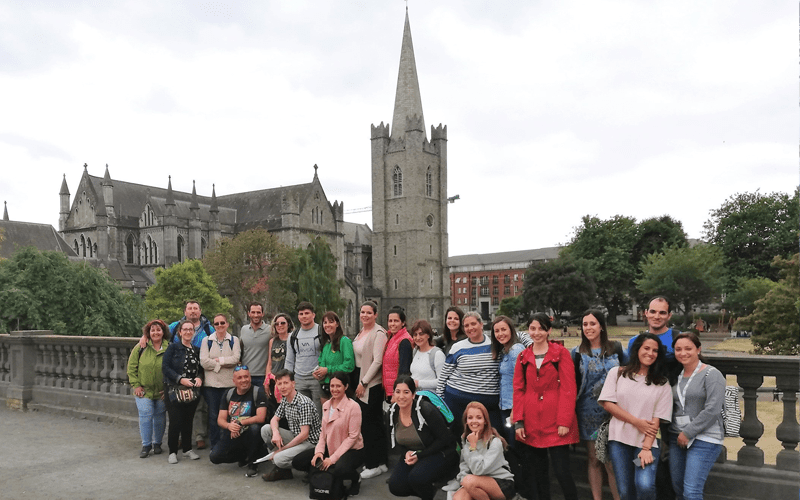Project-based Learning
in the Digital Age
Location: Dublin 2, Ireland
Explore Practical Ideas
30 Certified Hours Per week
City Centre Location
Contact us
project based learning for teachers
Project-based teaching promotes learning across a broad spectrum of knowledge, skills and competencies. Students engaged in project work are given the opportunity to develop their 21st century skills of inquiry, critical thinking, problem solving, creativity, flexibility and leadership. They learn important communication skills of negotiation, mediation, information exchange, and goal-oriented cooperation. The right project is motivational and supports students in self-directed learning.
This course is practical and explores a variety of digital tools to facilitate collaborative online learning, using a project-based methodology. Teachers will learn how to successfully organise and manage a project, from the initial project idea to the final student output. Throughout the course, teachers will look at ways of using technology as a tool in project-based learning, fostering digital literacy skills in their students. The course also focusses on ways teachers can monitor and feedback on language use and work on language development during a project cycle.
The main aim of this course is to help teachers:
- plan and implement a successful project using digital technologies,
- support students in the development of digital literacy skills by using technology to acquire, organise, store, demonstrate, and communicate information,
- support students in their language development during a project cycle.
ATC’s 1 week Project Based Learning in the Digital Age course can be combined with another Teacher Training and Development course or a General English course, to form a 2-week programme, contact us for details.
For teachers applying through the Erasmus Plus scheme the OID for ATC Language Schools is E10133233.
For details of this course on the European School Education Platform (ESEP) please see – ATC Project Based Learning in the Digital Age ESEP.
For more course choices please see the link – ATC Teacher Training & Development.
ATC Dublin
Maximum group size: 15
Minimum English Level: B2
Applicable for Erasmus+ KA1
Dublin Course Dates 2024:
Monday 25th to Friday 29th March
Monday 1st to Friday 5th July
2025 – Monday 13th to Friday 17th January
*Courses can also be organised year-round for closed groups in our Dublin City Centre or Bray school.
What you get
20 hours tuition + 10 hours of project work per week
Course materials included
Trainer feedback on project work
Interactive discussions with other teachers
End-of-course certificate
Is Project Based Learning For you?
This course is for language teachers who are interested in project-based learning (PBL) and wish to further develop their digital competencies for project-based teaching in the digital age.
Applicants must have a minimum B2 level of English, as outlined in the Common European Framework of Reference for Languages. If you would like to confirm your level, please contact us.
Teachers should bring a laptop or tablet, and a pair of headphones.
For teachers applying through the Erasmus Plus scheme the OID for ATC Language Schools is E10133233.
Student Reviews
Our teachers’ and students’ feedback about the course was enthusiastic and we owe this great result to the high professionalism of the teacher trainers from ATC and the perfect organisation of the course.
Pedagogically speaking, we are given all sorts of support, such as online support material given by the teachers according to our needs. The teachers are very high profile and committed to helping us develop.
further information
On this course, teachers will explore the theory and methodology behind project-based learning (PBL) and will develop confidence in creating and implementing authentic, motivating projects with real-world contexts relevant to their students’ interests and identities. Teachers will look at the role of language instruction in PBL and consider ways of developing students’ language skills and competencies, within the framework of a project-based methodology. Teachers will be supported to explore and use a variety of digital tools for collaborative project work.
Project Work
Teachers are set assigned project work which they carry out after their lessons. They are set a maximum of 10 hours of project work peer week, which they carry out over the course of the week. On Day 1 teachers work in pairs or small groups to choose a project outline and consider its main components. They then choose a small ‘slice’ of that project to develop into a final artifact for presentation. The aim of the project work is to encourage teachers to explore the digital tools looked at in the lessons and use them to work on their project slice, which they will present on their final day. Teachers will also be asked to take this time to record their reflections on their work, and on the processes involved in PBL.
Course Modules: The Case for PBL Teachers are introduced to the basic methodology behind PBL, exploring the many benefits of this approach. Planning a Project (Idea to Output) Teachers look at frameworks for planning projects from the initial project idea, through the process of project development and successful implementation, to the final project output. They learn how to create strong driving questions to initiate and focus projects. Acquiring Content Teachers look at tools and techniques for supporting students in their project research. Language Instruction in PBL In this module teachers consider language input and look at ways to guide students through target language research and to support students in their language output. They also look at ideas and techniques for helping students to notice and collect useful language throughout a project cycle. Creating and Organising Content Here teachers look at tools and techniques for supporting students in content creation and compiling digital portfolios of project work. Feedback and Reflection in PBL The aim of this module is to consider how we can best foster reflection, an important component of PBL. Teachers look at ways to encourage students to reflect on what they are learning, and how they are learning. We look at ways for giving and receiving feedback on project artefacts, focusing on both teacher-feedback and peer-feedback. Teachers will consider how project portfolios might be used for formative assessment and will explore tools for providing feedback on digital portfolios. Learning Objectives: By the end of the course teachers should be better able to: Teaching Style In-person training carried out in our Dublin City Centre or Bray schools, delivered by our experienced teacher trainers. Certificated hours At the end of the course, teachers will receive an ATC Language Schools’ Certificate of Attendance for the 30 or 60 hour programme of: Project-based Learning in the Digital Age. The 1 week course can be combined with a General English course, to form a 2-week programme. Please contact us for details. For teachers applying through the Erasmus Plus scheme the OID for ATC Language Schools is E10133233.

Teacher Training & Development - Project Based Learning - Brochure (pdf)
YOUR ENGLISH COURSE WITH atc...
We Have The Right Course for You!
Choose your course with ATC, select from our adult courses, junior courses or teacher training and development…


